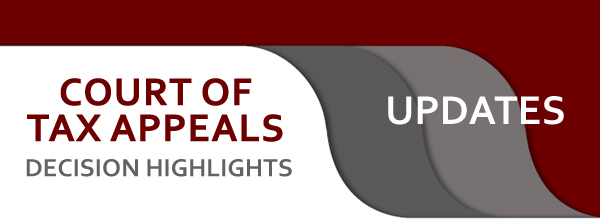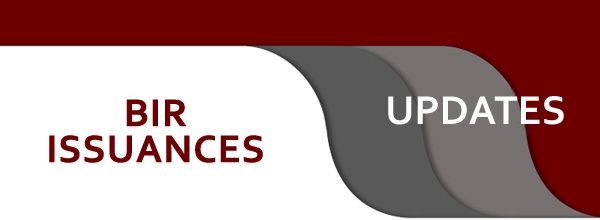

NOVEMBER • VOL. 11 • SERIES OF 2019
INSIGHTS is a monthly publication of BDB LAW to inform, update and provide perspectives to our clients and readers on significant tax-related court decisions and regulatory issuances (includes BIR, SEC, BSP and various government agencies).

DISCLAIMER: The contents of this Insights are summaries of selected issuances from various government agencies, Court decisions and articles written by our experts. They are intended for guidance only and as such should not be regarded as a substitute for professional advice.
Copyright © 2019 by Du-Baladad and Associates (BDB Law). All rights reserved. No part of this issue covered by this copyright may be produced and/or used in any form or by any means – graphic, electronic and mechanical without the written permission of the publisher.
What's Inside ...
- UPDATES
- Court Issuances
- CTA
- Regulatory Issuances
- BIR Issuances
- SEC Opinions & Decisions
- IC Issuances
- IC Opinions
- IC Rulings
- Court Issuances
- INSIGHTS
- Written and/or published articles
- OUR EXPERTS
- The Personalities


- Taxpayer is estopped from questioning the validity of waivers if it has paid the assessed tax. (San Miguel Foods, Inc. v. Commissioner of Internal Revenue, CTA Case No. 9241, October 2, 2019)
- The issuance of an Amended Assessment Notice by the BIR did not abandon the Original FAN. (Titanium Corporation v. Commissioner of Internal Revenue, CTA Case No. 9515, October 2, 2019)
- The authority to declare an administrative BIR Issuance void is within the jurisdiction of the CTA and not of the RTC. (Commissioner of Internal Revenue v. Spouses Michael Gavin, Richard L. De Los Reyes And Jennifer C. Co-De Los Reyes, CTA EB No. 1788 (CTA Case No. 9088), October 3, 2019)
- In a claim for refund of input VAT, it not necessary that there be zero-rated or effectively zero-rated transactions at the time the claimed input VAT was incurred or paid. (Commissioner of Internal Revenue vs. Maibarara Geothermal Inc., CTA EB No. 1863 (CTA Case Nos. 8871, 8937, 8999 and 9042), October 4, 2019)
- The assessment is valid despite the lack of an eLA if taxpayer actively participated in the conduct of audit by revenue officers authorized under manually-prepared LOA. (Altus Angeles, Inc. v. Commissioner of Internal Revenue, CTA Case No. 9164, October 8, 2019)
- Payment based on PAN is erroneous. (Toledo Power Company v. Commissioner of Internal Revenue, CTA Case No. 9307, October 9, 2019)
- RMC issued by the BIR such as RMC No. 17-2013 cannot be given retroactive application if it is prejudicial to the taxpayer. (Oceanagold (Philippines), Inc. v. Commissioner of Internal Revenue, CTA Case No. 9594, October 21, 2019)
- The CTA has jurisdiction to review the CIR’s denial of taxpayer’s offer of compromise. (Commissioner of Internal Revenue v. United Coconut Planters Bank, Case EB 1943, October 22, 2019)
- The jurisdiction of the CTA over criminal cases under the Tax Code is limited to claims amounting to at least P1 million, exclusive of charges and penalties, as provided by law. An assessment is not necessary to enforce collection of taxes through judicial action. (Kingsam Express Incorporation and Samuel S. Santos v. Commissioner of Internal Revenue, CTA EB Crim. No. 054 (CTA Crim. Case Nos. O-522, O-523, O-525, & O-554), October 24, 2019)
Taxpayer is estopped from questioning the validity of waivers if it has paid the assessed tax.
A taxpayer who pays an assessed tax shall be held in estoppel to question the waiver it executed prior to the issuance of the assessment.
In this case, if the taxpayer believed that the subject waivers were invalid, then it should not have partially paid the deficiency tax assessments. The fact that it had done so is an indication that it recognized the validity thereof. Thus, the taxpayer is in estoppel from questioning the subject waivers’ validity. (San Miguel Foods, Inc. v. Commissioner of Internal Revenue, CTA Case No. 9241, October 2, 2019)
The issuance of an Amended Assessment Notice by the BIR did not abandon the Original FAN.
In invoking prescription as defense against BIR’s assessment, taxpayer contends that the Amended Assessment Notices have abandoned and abrogated the original FAN issued by the BIR. While the original FAN was issued within the prescriptive period, the Amended Assessment Notices were issued only after more than seven (7) years.
The CTA found taxpayer’s argument unmeritorious. The CTA ruled that the issuance of an Amended Assessment Notice did not abandon the original FAN. Taxpayer failed to specifically indicate what details were not included in the original FAN that were included in the FDDA and the Amended Assessment Notices. The FDDA with Amended Notices constitute BIR's decision on taxpayer's request for reinvestigation. The FDDA and Amended Notices could not be regarded as new assessments since there was no change on the basis of the original income tax, VAT and EWT assessments issued against taxpayer. Thus, the contention of the taxpayer is erroneous. (Titanium Corporation v. Commissioner of Internal Revenue, CTA Case No. 9515, October 2, 2019)
In a claim for refund of input VAT, it not necessary that there be zero-rated or effectively zero-rated transactions at the time the claimed input VAT was incurred or paid.
Upon taxpayer’s filing of its administrative claim for refund involving its alleged unutilized input VAT for taxable year 2012, the BIR argued that it is not entitled to the refund since it did not have zero-rated sales in 2012 to which its input VAT can be attributed.
In ruling this case, the CTA held that the taxpayer is entitled to the refund. In a claim for refund of input VAT, it is not necessary that that there be zero-rated or effectively zero-rated transactions at the time the claimed input VAT was incurred or paid. What the law and the implementing regulations provide is that a taxpayer who has zero-rated or effectively zero-rated transactions is allowed to apply for the issuance of a tax credit certificate or for a tax refund for the input taxes paid. (Commissioner of Internal Revenue vs. Maibarara Geothermal Inc., CTA EB No. 1863 (CTA Case Nos. 8871, 8937, 8999 and 9042), October 4, 2019)
If the CTA Division renders an Amended Decision, taxpayer must again timely file a motion for reconsideration or new trial before appealing to the CTA En Banc.
In this case, the CTA ruled that when the Court in Division renders an Amended Decision, or one which modifies or reverses the finding/s in the Original Decision, it is virtually a decision different and distinct from the original one. As such, the party aggrieved by the Amended Decision must again timely file a motion for reconsideration or new trial thereto, lest the Amended Decision shall become final and executory.
In this case, however, the taxpayer utterly failed to do so. Given this fatal procedural mishap committed, the Amended Decision attained immutability and may no longer be disturbed. (Commissioner of Internal Revenue v. Irish Fe N. Aguilar, et al., CTA EB No. 1859 (CTA Case No. 9073), October 4, 2019)
Payment based on PAN is erroneous.
In this case, the taxpayer paid the deficiency VAT appearing in the PAN after the prescriptive period to reply to the said PAN has already lapsed. No FAN was issued after the taxpayer’s failure to file reply to the PAN.
The CTA then ruled that considering that no FAN was issued, the payment was not based on an assessment which became final and executory. The payment was not supposed to be collected. Accordingly, such erroneous payment made by the taxpayer based on the PAN alone may be recovered. (Toledo Power Company v. Commissioner of Internal Revenue, CTA Case No. 9307, October 9, 2019)
The assessment is valid despite the lack of an eLA if taxpayer actively participated in the conduct of audit by revenue officers authorized under manually-prepared LOA.
Taxpayer claimed that the assessment is void for failure of the revenue officers who conducted the audit investigation to replace the manually-prepared Letter of Authority (LOA) with an electronic Letter of Authority (eLA), as required under Revenue Memorandum Order (RMO) Nos. 62-2010 and 69-2010.
The CTA did not rule, however, in favor of the taxpayer. Nowhere in the said RMOs invalidates the manually-prepared LOAs when said LOAs are not retrieved and replaced with eLAs. In case the manually-prepared LOA is not replaced with a new eLA, the remedy of the taxpayer is to invoke Section 6 of RMO No. 62-2010 which allows taxpayers to not entertain any revenue officer, unless a new eLA has been issued.
Such right, however, may be waived when the taxpayer continues to allow the audit/investigation without protest, which taxpayer did in this case. Petitioner even executed several waivers extending the period to assess and it also actively participated in the audit/investigation conducted by the revenue officers authorized under the manually-prepared LOA. Thus, the assessment is valid under the manually-prepared LOA. (Altus Angeles, Inc. v. Commissioner of Internal Revenue, CTA Case No. 9164, October 8, 2019)
The authority to declare an administrative BIR Issuance void is within the jurisdiction of the CTA and not of the RTC.
The taxpayers in this case are employees of ADB whose compensation were subjected to income tax under Section 2(d)(1) of RMC No. 31-2013. On the basis of the decision made by RTC – Mandaluyong declaring the said provision void, the taxpayers then claimed for refund on the taxes withheld on their compensation.
The CTA then ruled against their favor and held that the RTC is without jurisdiction to declare Section 2(d)(1) of RMC No. 31-2013 void. The determination of the validity of administrative issuances issued by the BIR, such as RMC No. 31-2013, falls within the exclusive appellate jurisdiction of the CTA, not the RTC. Thus, RTC – Mandaluyong was not vested with jurisdiction to declare the invalidity of RMC No. 31-2013. The decision of the RTC is therefore void. (Commissioner of Internal Revenue v. Spouses Michael Gavin, Richard L. De Los Reyes And Jennifer C. Co-De Los Reyes, CTA EB No. 1788 (CTA Case No. 9088), October 3, 2019)
Compensation of Filipino employees of ADB are subject to income tax.
The taxpayers in this case are Filipino employees of ADB whose compensation were subjected to income tax, and thus, claimed for refund on the taxes withheld on their compensation. They argued that the government’s reservation to tax its citizens is not self-executing, such that a specific legislation must be passed to impose income tax on the salaries and emoluments of Filipino ADB employees, allegedly similar to the practice of other members of the ADB.
The CTA ruled against the taxpayers. It held that Congress indeed intended to tax the salaries and emoluments received by Filipino ADB employees and that they are covered by the provisions of the Tax Code. Thus, there is no need to enact a law to subject their income to tax.
The ADB Charter also clarifies that the tax exemption does not apply where the member-country retains the right to tax the salaries and emoluments paid by ADB to their citizens or nationals in the instrument of ratification or acceptance. The ADB Charter was ratified and confirmed by the Philippine Government with a reservation, through Senate Resolution No. 6 dated March 16, 1966, that the ratification and confirmation of the ADB Charter is "subject to the reservation that the Philippines declares that it retains for itself and its political subdivision the right to tax salaries and emoluments paid by the Bank to citizens or nationals of the Philippines.”
Thus, the income of Filipino employees of ADB are subject to income tax. (Commissioner of Internal Revenue v. Maria Lorena Dino, et al., CTA EB No. 1976 (CTA Case No. 9083) and Maria Lorena Dino, et al. v. Commissioner of Internal Revenue, CTA EB No. 1978 (CTA Case No. 9083), October 9, 2019)
Estoppel applies if taxpayer fails to impugn the validity of the waiver for a considerable period of time.
Taxpayer was assessed by the BIR for alleged deficiency taxes. Taxpayer then contends that the right of the BIR to assess the latter has prescribed because the two waivers previously executed are not valid and binding. The first waiver allegedly did not indicate the date of acceptance.
The CTA held that the taxpayer had reason to let the BIR believe that the waivers it executed were valid since the tolling of the prescriptive periods allowed it more time to prepare for its defense against the assessment. Here, the parties were given more than a year to further thresh out the issues of the assessments before the FAN was received. Without these two successive waivers, the BIR would have been compelled to issue the FAN much earlier, before prescription could set in. The taxpayer, therefore, benefitted from the extension afforded by the waivers and cannot belatedly assail the waivers when the consequences of the assessment resulted not in its favor.
Also, the taxpayer never raised the defect of the first waiver in the administrative level and even during trial. Taxpayer demonstrated a pattern of deliberately avoiding the issue concerning the first waiver. Thus, the taxpayer is now estopped from impugning the validity of the waiver when it remained silent for a considerable period of time on that very issue it is now raising before the court. By executing the second waiver, it acquiesced to the validity of the first and cannot now take a contrary position to the detriment of the other party who relied on the same. Thus, the assessment was upheld. (Commissioner of Internal Revenue v. JVC (Philippines), Inc. CTA EB No. 1744 (CTA Case No. 8646) and JVC (Philippines), Inc. v. Commissioner of Internal Revenue, CTA EB No. 1746 (CTA Case No. 8646), October 14, 2019)
Interest and surcharge may be waived if taxpayer acted in good faith when it relied on prevailing court decisions and previous BIR issuances at the time of occurrence of the transaction subject to tax.
In this case, the CTA ruled in favor of the taxpayer and granted its claim for refund of interest and surcharge on the DST paid on inter-company loan transactions covered by inter-office memoranda.
While a DST is imposed even in the absence of a debt instrument, interest and surcharge may not, however, be imposed if the taxpayer relied on prevailing court decisions and previous BIR issuances to the effect that inter-company loans and advances covered by inter-office memoranda were not loan agreements subject to DST. (Commissioner of Internal Revenue v. South Premiere Power Corp., CTA EB No. 1898 (CTA Case No. 9337) and South Premiere Power Corp. v. Commissioner of Internal Revenue, CTA EB No. 1899 (CTA Case No. 9337), October 14, 2019)
The absence of due date on the FAN/FLD invalidates the assessment.
In this case, the CTA ruled that the absence of due date on the FAN/FLD invalidates the assessment. An assessment does not only include a computation of tax liabilities, it also includes a demand for payment within a period prescribed.
Here, there was no time or date of payment indicated in the FLD. Hence, the subject tax deficiency assessment against the taxpayer is void and bears no valid fruit. (Nationwide Health Systems Baguio, Inc. v. Commissioner of Internal Revenue, CTA Case No. 9507, October 15, 2019)
RMC issued by the BIR such as RMC No. 17-2013 cannot be given retroactive application if it is prejudicial to the taxpayer.
The BIR assessed taxpayer for alleged deficiency excise taxes for taxable year 2014 when it is still exempt from excise tax, because the taxpayer was still under its recovery period. This exemption was also confirmed by the BIR in its BIR Ruling No. 10-2007 issued on May 4, 2007. On February 15, 2013, the BIR issued RMC No. 17-2013 which revoked BIR Ruling No. 10-2007, and thus, petitioner’s exemption from excise tax during its recovery period.
The CTA then ruled that RMC No. 17-2013 cannot be given retroactive application since it is prejudicial to the taxpayer. Any revocation, modification or reversal of any of the rulings promulgated by the BIR shall not be given retroactive application if the revocation, modification or reversal will be prejudicial to the taxpayers.
However, in this case, the taxpayer failed to present evidence to prove that the imposition of excise tax was made during the recovery period. Thus, the assessment against it for deficiency excise tax was upheld. (Oceanagold (Philippines), Inc. v. Commissioner of Internal Revenue, CTA Case No. 9594, October 21, 2019)
Failure of the taxpayer to present any accounting records or receipts to substantiate his expenses relating to its transactions justifies the BIR making an assessment based on the Best Evidence Obtainable.
Based on Revenue Memorandum Circular No. 23-00, assessment of tax based on "Best Evidence Obtainable” is allowed if there is a showing that expenses have been incurred, but the exact amount thereof cannot be ascertained due to absence of documentary evidence. In such case, the BIR may disallow 50% of the taxpayer’s claimed deduction.
Here, the taxpayer was unable to present any accounting records or receipts to substantiate his expenses. Thus, the revenue officers were justified in making an assessment based on “Best Evidence Obtainable.” In this case, the CTA thus resolved to apply the said "50% Rule." (People of the Philippines v. Rex Chua Co Ho, CTA Crim. Case Nos. O-287, O-288, O-289, O-290, and O-291, October 21, 2019)
Failure to pay the correct amount of tax must be wilful before a person may be criminally charged under Section 255 of the Tax Code.
In order to sustain a conviction for willfully failing to pay the correct tax under Section 255 of the Tax Code, the following elements must be established beyond reasonable doubt:
1. Accused are required under the Tax Code or its rules or regulations to pay any tax;
2. Accused failed to pay the required tax at the time required by law or rules and regulations; and
3. Accused’s failure to pay the required tax at the time required by law or rules and regulations is willful.
Here, accused Delgado, the CEO of the taxpayer, is a responsible officer of the taxpayer who is required to pay tax. It has also been sufficiently established that the taxpayer failed to pay the correct amount of deficiency income tax and VAT within the time prescribed in the assessment notices. However, the failure to pay such taxes were not willful because the prosecution failed to prove taxpayer’s receipt of the assessment notices.
Since the third element of the crime was not met, accused Delgado was acquitted. (People of the Philippines v. Jose Eduardo C. Delgado Delbros, Inc. CBW 124 District, 888 Delbros Avenue, Pascor Drive, Parañaque City, Case O-660, October 23, 2019)
The CTA has jurisdiction to review the Commissioner of Internal Revenue’s (CIR) denial of taxpayer’s offer of compromise.
In this case, the CTA held that it has the power to review the CIR’s denial of the taxpayer’s offer of compromise. Such authority arises from its power to review other matters arising under the Tax Code or other laws administered by the BIR.
Accordingly, the CIR’s discretionary authority to enter into a compromise agreement is not absolute. It thereof is subject to the determination of the CTA, whether the same is “within the parameters set by the law.” In case he abuses his discretion, the CTA may correct such abuse if the matter is appealed to it. (Commissioner of Internal Revenue v. United Coconut Planters Bank, Case EB 1943, October 22, 2019)
The jurisdiction of the CTA over criminal cases under the Tax Code is limited to claims amounting to at least P1 million, exclusive of charges and penalties, as provided by law. An assessment is not necessary to enforce collection of taxes through judicial action.
In cases arising from violations of the Tax Code, the CTA ruled that its jurisdiction is limited to criminal offenses where the principal amount of taxes and fees claimed, is at least P1 million, exclusive of charges and penalties, as provided by law, such as in this case. Hence, the CTA properly assumed jurisdiction over this case.
The taxpayers were properly accorded the constitutional right to due process even though there was only a two-day difference between the date of issuance of the Letter of Authority and the filing of the complaint. In ruling this, the CTA held that the BIR can exercise various options for the collection of taxes, such as (a) summary administrative remedies, precipitated by the issuance of a valid assessment, or (b) judicial action, whether through a civil or criminal action. In this case, the BIR enforced collection through the second mode. In exercising the right to enforce the collection of taxes through judicial action, an assessment is not necessary.
Here, the accused was also found criminally liable for attempting to evade or defeat taxes. They were liable to pay the tax but willfully evaded or defeated the payment thereof. The continuous and deliberate non-recognition of the acquired assets, cash outflow, and incurred loans as liabilities are clear indications of a scheme attempting to understate income and to evade or defeat the proper payment of tax. Accused’s denial and alleged reliance on the expertise of their accountant to determine what should or should not be reflected in the income tax return and financial statements is a willful act to delegate the performance of the legal duty to, tantamount to “deliberate ignorance” or “conscious avoidance” to ensure the accuracy of the information reflected in such documents. (Kingsam Express Incorporation and Samuel S. Santos v. Commissioner of Internal Revenue, CTA EB Crim. No. 054 (CTA Crim. Case Nos. O-522, O-523, O-525, & O-554), October 24, 2019)


- RMC No. 102-2019, October 4, 2019 – This provides some clarifications on Estate Tax Amnesty under Title II of RA No. 11213 or the Tax Amnesty Act, as implemented by RR No. 6-2019.
- RMC No. 103-2019, October 4, 2019 – Deductions are allowed from gross estate of non-resident aliens only if the value thereof at the time of death was declared as part of the gross estate of the non-resident alien situated in the Philippines.
RMC No. 102-2019, October 4, 2019
This provides some clarifications on Estate Tax Amnesty under Title II of RA No. 11213 or the Tax Amnesty Act, as implemented by RR No. 6-2019.
The BIR clarified:
1. If the estate involves several stages of succession and the succeeding decedents, during their lifetime, owned separate properties other than the properties emanating from the first decedent, the estate tax amnesty return shall be individually filed at the Revenue District Office (RDO) having jurisdiction over the last residence of each decedent.
2. A supplemental extra-judicial settlement covering the undeclared real or personal property is required to avail an estate tax amnesty. An extra-judicial settlement is also required if the heirs want to avail of estate tax amnesty, even if they do not want to adjudicate the respective share of each heir as they will form an estate/trust.
3. If an estate tax return had been filed prior to 2018 for which a tax clearance was issued but the Certificate Authorizing Registration (CAR) was not released, the heirs cannot avail of the estate tax amnesty and credit the estate tax payment. The heirs should instead request for issuance and release of CAR.
4. If the decedent has an on-going investigation in an RDO which is different from the revenue district that has jurisdiction over his domicile, the estate tax amnesty shall be filed with the RDO having jurisdiction over the last residence of the decedent. However, the on-going investigation shall be consolidated in the RDO where the estate tax return shall be filed.
5. If the decedent has an on-going investigation, an Electronic CAR (eCAR) may be issued, provided that the filer shall post a bond, either through a bonding company or a cash bond, which will be used to settle any deficiency tax liability. The concerned Revenue Officer shall be required to prepare a proposed assessment on other tax liabilities which shall be the basis of the bond.
6. The filer can still avail of the estate tax amnesty in case deficiency tax has been noted by the Assessment Division even if an eCAR has already been issued for a regular estate tax transaction. Thereafter, an another eCAR need not be issued. A Certificate of Availment (CA) would suffice.
7. The filer can still avail of the estate tax amnesty even if the owner’s copy of Transfer Certificate of Title (TCT) was lost. A certified true copy of the Original Certificate of Title (OCT), TCT or the Condominium Certificate of Title (CCT) of the property may be submitted.
8. The filer can still avail of the estate tax amnesty even if the Registry of Deeds’ (RD) copy of the OCT/TCT/CCT was lost. In such case, the owner’s copy of the OCT/TCT/CCT together with Certificate of Loss issued by RD shall be submitted. However, only the CA shall be issued while the eCAR shall be issued only when the certified true copy of the reconstituted title is submitted.
The CA will contain the list of properties subject of estate tax amnesty. It shall also reflect a statement that, “In case there are properties covered under Section 3 of RR No. 6-2019 which are included in the application for estate tax amnesty, the application pertaining to such properties shall be considered null and void.”
9. The judicial expenses pertaining to issue of heirship cannot be deducted as expenses against the estate, even if these pertain to expenses in a pending case filed in court regarding the heirship of the
properties of the estate which was previously filed/settled extrajudicially, and for which a CAR had already been issued.
10. Medical expenses are treated as special deductions.
11. In case the decedent has many heirs, self-adjudication shall not be allowed. An extra-judicial settlement must be signed by all the heirs.
12. General waiver or renunciation of rights, interest and participation shall not be subject to donor’s tax and DST.
RMC No. 103-2019, October 4, 2019
This clarifies the allowable deductions from the gross estate for non-resident aliens pursuant to the Tax Amnesty Act.
Starting from July 1, 1939, deductions allowed from gross estate of non-resident aliens shall only be allowed if the executor, administrator, or anyone of the heirs, as the case may be, includes in the return required to be filed, the value at the time of death of that part of the gross estate, of the non-resident alien, situated in the Philippines.
RMC No. 107-2019, October 15, 2019
This extends the validity period for both the (a) Certificates of Accreditation issued to developers/dealers/supplier-vendors/pseudo-suppliers of Cash Register Machines, Point-of-Sale Machines, and other sales machines/receipting software and (b) Permits to Use (PTUs) such machines.
If the Certificates and PTUs were issued prior to August 1, 2020, the effectivity date of issuance will be on August 1, 2010 and they shall be valid until July 31, 2025. On the other hand, if they were issued either on or after August 1, 2020, the effectivity date of issuance shall follow the actual date of issuance, and they shall be valid until five (5) years from the date of issuance.
RMO No. 51-2019, October 22, 2019
This provides the guidelines and procedures for the processing and issuance of Tax Residency Certificates (TRC). TRCs are secured by Philippine residents deriving income from sources within the jurisdiction of a Contracting State who intend to avail the preferential tax treatment under the effective tax treaties of the Philippines.
In securing the said TRCs, the following procedures shall be observed:
1. The taxpayer must submit a letter-request addressed to the Chief of the International Tax Affairs Division (ITAD), together with the supporting documentary requirements.
2. The letter-request shall contain the name of the taxpayer, type of income derived abroad, amount, period covered and a narration of the attachments. In case a documentary requirement is not applicable or available, a statement to that effect should be indicated in the letter-request and the reason therefor.
3. The ITAD shall verify the veracity of the information adduced by the applicant.
4. The ITAD shall act promptly and expeditiously on all applications for TRCs. Normal processing time is 14 working days from submission of complete documents.
5. The TRCs shall be signed by the Assistant Commissioner for Legal Service and shall also bear the seal of the office.
6. The signed TRCs shall be released to the applicant or its duly authorized representative upon presentation of a Special Power of Attorney and the appropriate proof of identification.
A letter of denial shall be issued if, based on the submitted documents, either the taxpayer is not entitled or has submitted fake documents.


- SEC-OGC Opinion No. 19-44, October 4, 2019 – Catering of food falls within the definition of retail trade.
- SEC-OGC Opinion No. 19-46, October 7, 2019 – Engaging in the selling of merchandise as an incident to the primary purpose of a corporation does not constitute retail trade.
SEC-OGC Opinion No. 19-44, October 4, 2019.
This opinion was issued at the request of PAFKRU SK, Inc. (PAFKRU) to determine whether or not its business model qualifies as a retail trade under the Retail Trade Liberalization Act of 2000 (RTLA). PAFKRU is primarily engaged in event management services, which includes party catering services.
Section 3 of RTLA defines retail trade as any act, occupation or calling of habitually selling direct to the general public merchandise, commodities or goods for consumption. For sales transaction to be considered as “retail,” the following elements must concur:
1. The seller should be habitually engaged in selling;
2. The sale must be direct to the general public; and
3. The object of the sale is limited to merchandise, commodities or goods for consumption.
Based on the foregoing, the SEC opined that PAFKRU is not a retailer insofar as its event organizing services are concerned. As an event organizer, it does not sell goods, merchandise or commodities to its customers but simply renders services for hire or pay.
However, it is considered as retailer insofar as its event catering services are concerned. Catering is sale of food eaten and falls within the definition of retail trade. Catering of food should not be treated as incidental only to PAFKRU’s services as event organizer because the biggest expense in catered events is food. Effectively, an event organizer like PAFKRU providing food is actually an event caterer. PAFKRU was not also able to prove that its services is not offered to the general public.
In opening a customer lounge selling merchandise, PAFKRU will also be engaging in retail trade.
SEC-OGC Opinion No. 19-46, October 7, 2019
This opinion was issued at the request of Deetha Auraa, Inc. (Deetha) to confirm whether or not it is engaged in retail trade.
Deetha is engaged in the establishment and operation of optical clinics managed by professionally registered optometrists to provide optometry services. The optical clinics, through Deetha’s duly licensed optometrist, mainly conducts eye check-up and recommends appropriate prescription lenses and eyeglasses frames to its patients. The sale is only done after a thorough examination is conducted by an optometrist, which makes it merely incidental in providing a complete care service to patients.
The SEC then opined that Deetha is not engaged in retail trade. Considering that the sale of lenses and frames are made only after the prescription of the optometrist and specific to a particular patient, the same are not available to the general public. Further, the SEC had consistently opined that engaging in the selling of merchandise as an incident to the primary purpose of a corporation does not constitute retail trade.


- IC-CL No. 2019-59, October 29, 2019 – Requests for legal opinion shall now be free of charge.
- IC-CL No. 2019-61, October 30, 2019 – Information on the premium shall no longer be indicated in the statement, proof of cover, confirmation or certificate.
- IC-CL No. 2019-60, October 30, 2019 - This provides some guidelines on the declaration and/or distribution of dividends of domestic insurance companies doing business in the Philippines.
IC-CL No. 2019-59 (October 29, 2019).
Requests for legal opinion shall now be free of charge.
| Section 3, IC-CL No. 2017-13 | Section 3, IC-CL No. 2019-59 |
|
All requests for legal opinion shall initially be evaluatedby the Insurance Commissioner, throughthe Legal Services Group. Upon evaluation, the Commission shall issue an Order of Payment for the appropriate docket fee. The docket fee shall range from Two Thousand Pesos (Php 2,000.00) to Five Thousand Pesos (Php 5,000) depending on the difficulty/novelty of the legal opinion requested. Once the docket fee is paid and proof of such payment is duly presented, the request shall be docketed and assigned to an action officer. |
All requests for legal opinion shall initially be evaluated by the Insurance Commissioner, through the Legal Services Group. Once evaluated, the request shall be docketed and assigned to an action officer. |
IC-CL No. 2019-61 (October 30, 2019)
Information on the premium shall no longer be indicated in the statement, proof of cover, confirmation or certificate
| Section 6.4, IC-CL No. 2017-57 |
Section 6.4, IC-CL No. 2019-61 |
|
The statement, proof of cover, confirmation or certificate shall contain the following information: a. The full corporate name, address and contact details of the insurer; |
The statement, proof of cover, confirmation or certificate shall contain the following information: m. The full corporate name, address and contact details of the insurer; Details as to the premium must be provided in the Master Policy as required under Section 51 of R.A. No. 10607 otherwise known as the Amended Insurance Code. |
IC-CL No. 2019-60, October 30, 2019
This provides some guidelines on the declaration and/or distribution of dividends of domestic insurance companies doing business in the Philippines.
The Insurance Commission provides that a domestic insurance company does not need its prior approval before declaring and/or distributing dividends. The domestic insurance company only needs to submit a report, through the Investment Services Department, within 30 days after such declaration and/or distribution.
The report shall be accompanied by the following documents:
1. Certification under oath by the Corporate Secretary on the board of directors resolution declaring dividends;
2. Approved synopsis of the Annual Statement as of the last fiscal year;
3. Interim unaudited financial statements certified by the Finance Officer (if the basis of determining the sufficiency of retained earnings is other than the approved synopsis of the Annual Statement);
4. Notarized Secretary’s Certificate of the Board Resolution as of the reversal of appropriated retained earnings to unappropriated retained earnings; and
5. Secretary’s Certificate of no pending case of intra-corporate dispute.
In case of stock dividend, the following additional documents must be submitted:
1. List of stockholders with their respective subscribed capital stock as of the date of the meeting approving the declaration of stock dividend together with the allocation of stock dividend under oath by the Corporate Secretary; and
2. Analysis of capital structure certified under oath by the Treasurer.
In case of property dividend, the following documents will also be submitted:
1. List of stockholders with their respective subscribed capital stock as of the date of the meeting approving the declaration of property dividend together with the allocation of property dividend under oath by the Corporate Secretary;
2. Detailed schedule of the property account appearing in the Annual Statement; and
3. Certification by the President that the property/ies for dividend declaration is/are no longer needed in the operation of the company.
No domestic insurance company shall declare or distribute any dividend on its outstanding stocks unless it has met the minimum paid-up capital and net worth requirements. The dividends must also come from the profits attested in a sworn statement to the Insurance Commissioner by the president or treasurer of the company to be remaining on hand after retaining unimpaired:
1. The entire paid-up capital stock;
2. The solvency requirements defined by Section 200 of the Insurance Code;
3. In case of life insurance corporations, the legal reserve fund required by Section 217 of the Insurance Code;
4. In case of corporations other than life, the legal reserve fund required by Section 219; and
5. A sum sufficient to pay all net losses reported, or in the course of settlement, and all liabilities for expenses and taxes.


- IC- LO No. 2019-10, October 29, 2019 – When the intended business activity does not involve the assumption of risk, there is no contract of insurance. If the primary purpose of the entity is also the rendition of service, the entity will not be doing an insurance business. Finally, when there is only doing of some act that imparts knowledge of the product or service to the extent of minimizing, if not eliminating, the element of chance or risk, the contract is that only of a warranty and not of an insurance.
IC- LO No. 2019-10, October 29, 2019
This opinion was issued at the request of Mitsui & Co. (Asia Pacific) Pte. Ltd. (Mitsui) to confirm whether or not its intended business activity will constitute as doing insurance business.
Mitsui intends to engage in the business of (a) repair services for all kinds of motor vehicles, including the operation of a mobile or roving repair service; (b) consultation, inspection and certification on the quality of used motor vehicles; (c) assisting used car dealers in providing warranty to its consumers by conducting an inspection and certification of the quality of used motor vehicles and assisting such used car dealers in the processing of claims in relation to their warranty.
A contract of insurance is an agreement whereby one undertakes for a consideration to indemnify another against loss, damage or liability arising from an unknown or contingent event. The following requisites must be met:
1. The insured has an insurable interest;
2. The insured is subject to a risk of loss by the happening of the designated peril;
3. The insurer assumes the risk;
4. Such assumption of risk is a part of general scheme to distribute actual losses among a large group of persons bearing a similar risk; and
5. In consideration of the insurer’s promise, the insured pays a premium.
Here, the Insurance Commission opined that Mitsui shall not be engaging in an insurance business with its intended activity. The intended business activity does not involve the assumption of risk. Mitsui’s intended “Used Car Warranty Business Model” merely guarantees the accuracy of the advice that it will provide with the condition of certain car parts and the reasonable period within which these parts can be expected to work in good condition. The “Used Car Warranty Business Model” does not operate as a risk-distributing device but, instead, offers certain services and warranty for such services.
Since the primary purpose of Mitsui’s intended business activity is the rendition of service, it is therefore not doing an insurance business pursuant to the ruling of the Supreme Court in Philippine Health Care Providers, Inc. v. Commissioner of Internal Revenue (G.R. No. 167330).
Mitsui’s rendition of services clearly constitutes only of a contract of warranty which is the doing of some act that imparts knowledge of the product or service to the extent of minimizing, if not eliminating, the element of chance or risk.
IC-LO No. 2019-11, October 30, 2019
This provides that health maintenance organizations (HMOs) are not covered under Part 1 (VII) (C) (5) of the Anti-Money Laundering Council Registration and Reporting Guidelines (ARRG), which defers no/low risk covered transaction of group life insurance and hospitalization insurance.
Had AMLC intended to include HMO products in the enumeration of no/low risk transactions in the regulatory issuance, the same could have been expressly provided in the ARRG. But this was not the case. Hence, HMOs are not within the purview of the aforementioned ARRG.


- ICR No. 2019-05, October 29, 2019 – When contracts for the rendition of services provide for neither a payment period nor payment by instalments, services are clearly not in the nature of pre-need plans.
ICR No. 2019-05, October 29, 2019
The issuance of this ruling was initiated by Philippine Federation of Pre-Need Plan Companies, Inc. at its request to investigate whether or not The Evergreen Chapels (Pasig), Inc. (Evergreen) is engaged in pre-need business.
Evergreen offers funeral, cremation, embalming and document processing products/services. Payment by installments is not allowed but individuals availing of products/services are required to pay a non-refundable deposit of any amount.
A “pre-need company” refers to schools, memorial chapels, banks, nonbank financial institutions and other entities which have also been authorized/licensed to sell or offer to sell pre-need plans insofar as their pre-need activities or business are concerned. Pre-need plans are contracts, agreements, deeds or plans for the benefit of the planholders which provide for the performance of future service/s, payment of monetary considerations or delivery of other benefits at the time of actual need or actual maturity date, in exchange for cash or installment amounts with or without interest or insurance coverage and includes life, pension, education, interment and other plans, instruments, contracts or deeds as may in the future be determined by the Insurance Commission.
Based on the foregoing, Evergreen’s services are clearly not in the nature of pre-need plans. Evergreen’s contracts for its funeral and cremations services provide for neither a payment period nor payment by installments. Payment is made only upon the delivery of the funeral goods or services.


CITIRA and Transfer Pricing
By Benedicta 'Dick' Du-Baladad
The current Section 50 of the Tax Code (copied from the US Tax Code) is the source of the Bureau of Internal Revenue’s (BIR) authority to reallocate income and expenses between related parties, effectively disregarding contracts and agreements in what is called “sweetheart deals” or “transfer pricing schemes.” Section 50 meant to give full powers to the Commissioner of Internal Revenue to prevent erosion of revenues.
But Section 50 seems weak, from a legal standpoint, as it is too much of a motherhood statement not strong enough to call a spade a spade. Not a single case of transfer pricing has been won in Court by the BIR, perhaps due to the difficulty in proving that prices are not at arm’s-length, or that legally, there is no sufficient legal basis to impugn valid agreements between related parties, even in agreements involving sweetheart deals.
In the case of Filinvest v. Commissioner of Internal Revenue (GR 163653 and 167689, July 19, 2011), a transfer pricing test case, the BIR imputed interest income to a holding company which re-lent the proceeds of a loan taken from a bank to its operating subsidiary. The BIR won in the tax court but upon appeal, the Supreme Court canceled the assessment stating that the BIR has no power to impugn valid contracts and arrangements unless it is against public order or policy. According to the Court, the BIR’s broad powers of distribution, apportionment, allocation of gross income and deductions, does not include the power to impute “theoretical interests” to the controlled taxpayer’s transactions. In other words, the BIR has no power to impute income where no income was agreed upon by the related parties. In this case, between a holding company and a subsidiary. Such power is not covered under Section 50.
Now, here comes Corporate Income Tax and Incentives Rationalization Act (Citira) wanting to strengthen that power. The government fears that our country has become a target of transfer pricing schemes by multinational enterprises and there is a need to arrest this situation. This fear is well-founded and could be true. The Philippines is a high-tax jurisdiction, our tax laws against transfer pricing and profit shifting is not rock-solid, audit enforcement to capture transfer pricing schemes is weak. All the ingredients for a likely target of profit shifting are present. In short, the country is exposed to transfer pricing practices without adequate cover.
Domestic transfer pricing practices by conglomerates and related-parties are also being eyed by the government to be tightened. The wide array of tax incentives gave a wider opportunity to save on taxes through shifting of income and deductions between one subject to regular taxes vis-à-vis one with incentives. Such shifting is done with the overall objective of having a bigger income for the group net of tax.
Under Citira, Section 50 was amended to give clear, specific powers to the Commissioner of Internal Revenue that includes not only the power to allocate, apportion or distribute income and deductions between related parties, but also the power to impute income. The inclusion of “authority to impute” now corrects the loophole in the Filinvest case where the Supreme Court said that Section 50 did not include the power to impute income.
Likewise, Citira clarified that the same power can be exercised by the Commissioner where a transaction or arrangement is motivated by obtaining a tax benefit or advantage with no commercial reality or economic effect. Examples of obtaining benefit are: altering the incidence of a tax, relieving a person from a tax liability, avoiding or postponing a tax liability.
The phrase “no commercial reality or economic effect” is a question of fact which the taxpayer being assessed has the burden to dispute. Another difficult hurdle with the BIR.
The old school of thought that tax avoidance is legal and allowed, in contrast to tax evasion which is illegal, will eventually be discarded by Section 50 once amended. Any transaction where the motive is to obtain a tax benefit, regardless if through tax avoidance or tax evasion, can be voided by the Commissioner under the proposed amendment of Section 50. The only difference, perhaps, is the criminal liability that is attached to tax evasion, but not on avoidance. The dividing line between evasion and avoidance has become thinner with Citira’s proposed amendment to Section 50. Thus, a more careful and prudent tax planning is necessary.
The intent of the government to plug loopholes that lead to erosion of revenues through transfer pricing schemes is very clear. Aside from amendments introduced in Citira, the BIR also issued Revenue Audit Memorandum Order (Ramo) 1-19 on August 20, 2019. This BIR issuance was meant to complement Citira through stricter enforcement of transfer pricing audits and requirement for transfer pricing documentation.
I heard that the BIR is continuously undertaking training of its examiners on transfer pricing audits. But I have yet to hear if the necessary databases for the benchmarking have already been secured. Upon Citira becoming a law, we expect a vigorous enforcement of Section 50.
Ramo 1-19 basically follows the internationally accepted OECD transfer pricing rules and principles. My take is that, as long as the BIR sticks with these principles, there is no cause to worry. On the part of businesses with related-party transactions, preparedness is the key.
---------------------------------------------------------------
For inquiries on the article, you may call or email
ATTY. BENEDICTA “Dick” DU-BALADAD
Founding Partner & CEO
T: +63 2 403 2001 loc. 300
This email address is being protected from spambots. You need JavaScript enabled to view it.



DISCLAIMER: The contents of this Insights are summaries of selected issuances from various government agencies, Court decisions and articles written by our experts. They are intended for guidance only and as such should not be regarded as a substitute for professional advice.
Copyright © 2019 by Du-Baladad and Associates (BDB Law). All rights reserved. No part of this issue covered by this copyright may be produced and/or used in any form or by any means – graphic, electronic and mechanical without the written permission of the publisher.





